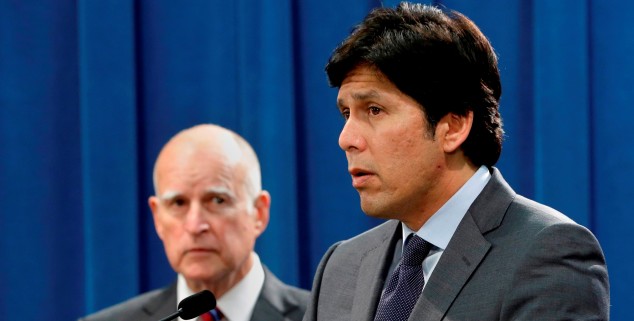News
Fuel cut fades before oil industry
 Senate Leader Kevin de Leon and Gov. Jerry Brown, left, announce scaling back SB 350. (Photo AP/Rich Pedroncelli)
Senate Leader Kevin de Leon and Gov. Jerry Brown, left, announce scaling back SB 350. (Photo AP/Rich Pedroncelli)To the surprise of few in the Capitol, the heart of landmark legislation to cut California’s gasoline use in half was gutted under fierce pressure from the oil industry – leaving a weakened bill and an angry Gov. Brown.
An impassioned Brown said he would push for new ways to cut climate-changing greenhouse gases during the remaining three years of his governorship, either through legislation, executive orders — or both.
The 50 percent cut in fuel consumption was removed, but the bill retains a provision requiring a doubling of building insulation and a boost in the use of power from renewable energy sources.”
“My zeal is intensified to a maximum degree!” Brown thundered at a Capitol briefing. “This is a life and death struggle, and it’s not going to be finished in six months, or six years…We might get another bill next year, we might keep doing it by regulation.”
His comments followed the announcement that a key piece of SB 350 by Senate Leader Kevin de León, D-Los Angeles, was headed for certain defeat unless the centerpiece provision – cutting gasoline consumption in half by 2030 – was eased and the power of air quality enforcers was curbed.
De León said the petroleum industry had spent millions of dollars across the state on messages that poor communities would be harmed. “We still weren’t able to overcome the silly season scare tactics,” he said, adding that the industry spent millions of dollars in an unprecedented effort to block the bill. “’Big Oil’ might be on the right side of the shareholder reports, but we are on the right side of the history”
The Western States Petroleum Association released a written statement that said that “today’s announcement was an acknowledgement that California’s energy future, economic competitiveness, and environment are inextricably linked.”
The 50 percent cut in fuel consumption was removed, but the bill retains a provision requiring a doubling of building insulation and a boost in the use of power from renewable energy sources, all by 2030. The bill passed out of the Senate in June. Legislative leaders “agreed to amend SB 350 to remove the petroleum section and move forward with the other two sections — which, by any standard, are in and of themselves landmark achievements,” de León said.
But in the Assemby, it faced opposition not only from Republicans but from business-friendly Democrats. Democrats control the Assembly, but only narrowly — just a few Democrats joining Republicans against the bill would seal its fate.
Another major environmental bill, SB 32 by Sen. Fran Pavley, D-Agoura Hills, remained intact – for now.
Pavley’s bill would require the state to cut carbon emissions to 40 percent below 1990 levels by 2030, and to 80 percent below those levels by 2050. Her latest measure expands provisions contained in AB 32, the state’s 2006 landmark law to curtail greenhouse gases, and it would put into statute the provisions of executive orders signed by former Gov. Arnold Schwarzenegger and Brown.
Pavely’s bill, approved by the Senate and awaiting action in the Assembly, went to the floor for surprise vote Tuesday, where it received only 30 votes – 11 shy of the 41-vote majority needed in the 80-member house. But 15 members did not vote and permission was granted to bring the bill back for another floor vote. The clock is ticking on the legislation: The legislature recesses for the year in two days.
“We are still assessing how the Assembly wants to move forward,” Pavley said in a written statement released by her office. “But move forward we must because doing nothing is not an option.”
Want to see more stories like this? Sign up for The Roundup, the free daily newsletter about California politics from the editors of Capitol Weekly. Stay up to date on the news you need to know.
Sign up below, then look for a confirmation email in your inbox.

Leave a Reply